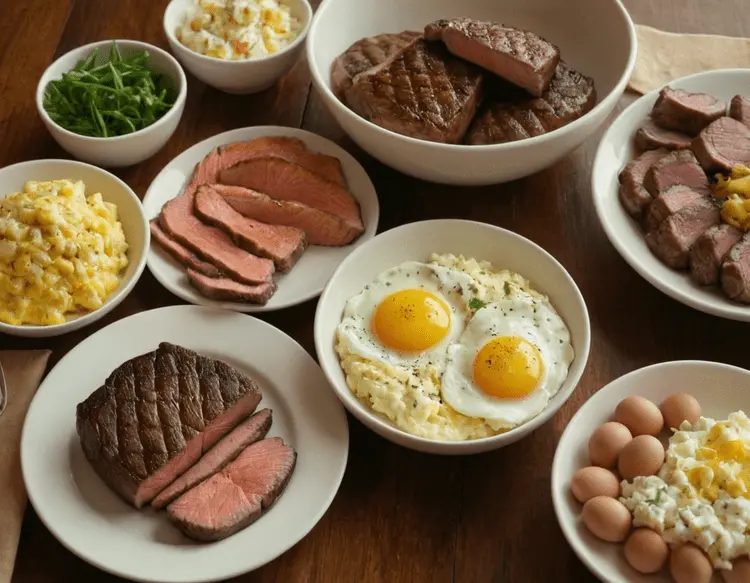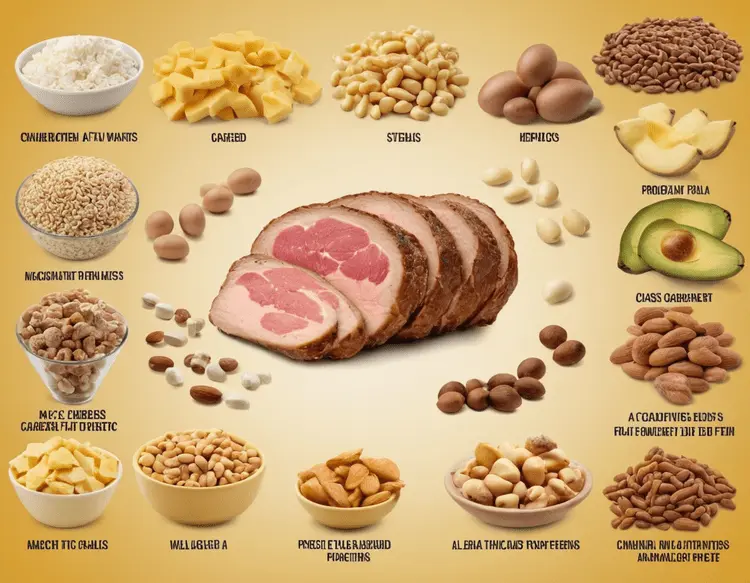Curious about the buzz around the animal-based diet? Also known as the carnivore diet, meat-based diet, or animal-centric eating, this approach is gaining popularity for potential health benefits.
But with claims of weight loss and improved energy come questions about safety, sustainability, and long-term effects.
Should you ditch the carbs and go all-in on animal foods? In this post, we’ll break down the pros, cons, and practicalities of adopting an animal-based diet
Introduction
Have you ever wondered if all those vegetables and grains are truly the key to a healthy body? Are you tired of feeling sluggish, bloated, or just not your best? What if focusing on animal-based foods could unlock a new level of health for you?
The animal-based diet is a bold approach that flies in the face of conventional wisdom. It emphasizes things like meat, fish, eggs, and sometimes dairy. Think of it as a modern spin on how our ancestors may have eaten.
But is it safe? Is it sustainable? Could it actually be the answer to some of your health struggles?
Let’s explore! This guide delves into the potential benefits and the real risks of an animal-based diet. You’ll find tips for getting started, recipes to try and how to make this way of eating work for you.
- Weight loss?
- Blood sugar control?
- Gut health?
There might be some surprising answers in store. However, this isn’t a one-size-fits-all plan. As with any dietary shift, it’s wise to consult a healthcare professional (especially if you have existing conditions). You can find more information from trusted organizations like the Mayo Clinic
Ready to dive in? Let me know what questions you have about the animal-based diet below, or tag me on social media!
Understanding Animal-Based Diets

Have you heard the buzz about the animal-based diet? It’s a hot topic, with claims about weight loss, better health, and improved energy. But what exactly is an animal-based diet? Let’s dive in and explore!
What is an Animal-Based Diet?
Fundamentally, an animal-based diet prioritizes foods from animal sources. Think meat, poultry, fish, eggs, and sometimes dairy. The emphasis is on whole, unprocessed animal foods.
However, there’s a catch! The term “animal-based” is pretty broad. Just like there are different vegetarian diets, there’s a spectrum within this way of eating too.
Variations Within the Animal-Based Approach
Here’s a quick look at some common variations:
- Carnivore: The strictest version – only animal products, nothing else.
- Ketogenic: Often paired with an animal-based approach, this means very high fat and extremely low carb.
- Paleo-Inspired: May include some fruits, veggies, and nuts, along with the animal foods.
- Nose-to-Tail: Focuses on eating the whole animal, including nutrient-dense organ meats.
So, which type is right for you? Honestly, that depends! It’s about finding a version that feels sustainable and works for your body. Think about your health goals and what feels realistic.
Want to learn more about the differences between carnivore and an animal-based diet? Check out this resource from the Cleveland Clinic on different types of protein diets. Or, if you’re into the idea of organ meats for a nutritional boost, the Mayo Clinic has insights on the healthiest fats.
Benefits & Risks of Animal-Based Eating
Potential Benefits
Picture this: you’re feeling more energized, shedding extra weight, maybe even managing health conditions better. Could an animal-based diet be the key? Let’s dive in!
- Weight Management: Animal-based diets are packed with protein and healthy fats, boosting satiety. This can lead to eating less overall, supporting weight loss goals.
- Improved Metabolic Health: Ever struggled with blood sugar swings? Animal-based eating goes low-carb, potentially improving insulin sensitivity. This is great news for managing conditions like type 2 diabetes.
- Reduced Inflammation: Think of inflammation as a constant, low-grade fire in your body. Highly processed foods, refined sugars, and potential allergens can fuel it. An animal-based diet cuts these out, possibly easing chronic inflammation linked to various diseases.
- Increased Nutrient Density: Animal-based diets, especially those including organ meats, are nutrient powerhouses. You get a concentrated dose of vitamins, minerals, and healthy fats essential for optimal health.
Risks and Considerations
Hold on, there’s always another side to consider! Is an animal-based diet all sunshine and rainbows? Let’s explore some potential downsides:
- Potential Nutrient Deficiencies: Plant foods offer unique vitamins, minerals, and fiber. Going strictly animal-based might create gaps. Consider strategic supplements or carefully including some plant foods for the best of both worlds. For the most important vitamins and minerals.
- Possible Gut Health Imbalances: Is a healthy gut on your priority list? Fiber nourishes beneficial gut bacteria. Long-term, very low-fiber diets might create an imbalance. Learn more about the amazing benefits of fiber from Harvard Health: https://www.health.harvard.edu/staying-healthy/fabulous-fiber
- Cardiovascular Concerns: The role of saturated fat in heart health remains debated. While some studies suggest an animal-based focus is fine, others raise caution. Prioritizing lean protein sources and balancing with healthy fats is wise.
- Social Sustainability: Can you picture yourself enjoying dinner parties on an animal-based diet? Social situations might get tricky. Planning ahead and flexibility can help!
Let’s Chat! Have you tried an animal-based diet? What benefits or challenges did you experience? Tag us on social media and share your journey!
Getting Started & Making It Work

How to Start an Animal-Based Diet
Ready to try an animal-based diet? Don’t dive in headfirst! A gradual transition is key to easing your body into this new way of eating. Think of it as an experiment. How does your energy level change? Does your digestion improve? Pay close attention to these signals.
Gradual Transition
- Start slow. Drastically slashing carbs and upping meat intake can shock your system. Begin by slowly increasing protein portions and reducing processed foods.
- Listen to your body. Is a strict carnivore approach right for you, or does a bit of fruit and honey feel better? Your ideal animal-based diet is personal.
Food Quality Matters
Where your food comes from is crucial on an animal-based diet. Prioritize:
- Grass-fed and pasture-raised meats: These offer a healthier nutrient profile compared to conventional meats.
- Wild-caught seafood: Aim for sustainable, low-mercury options.
- Organ meats: True nutrient powerhouses! Check out desiccated organ supplements from reputable sources like Heart & Soil Supplements: https://heartandsoil.co if you can’t stomach the fresh versions.
Supplements to Consider
Depending on how restrictive your animal-based diet becomes, supplements might be helpful:
- Multivitamin: Provides a safety net for potential micronutrient gaps.
- Fiber: Keeps your gut bacteria happy.
- Electrolytes: Especially important in the early low-carb adjustment phase.
Hydration
Water is your best friend! When you reduce your consumption of water-rich foods like fruits and vegetables, intentional hydration becomes vital. Aim for clear or pale yellow urine as a sign you’re drinking enough.
Advanced Considerations
Ready to take your animal-based diet deeper? It’s time to think beyond the immediate benefits and start exploring the complexities.
Long-Term Health on an Animal-Based Diet
Truthfully, research on the extremely long-term outcomes of an animal-based diet is limited. Is it optimal for decades of life? That’s still being explored. So, what should you do?
- Prioritize regular checkups. Work with a healthcare provider to monitor your bloodwork for key markers like cholesterol, vitamins, minerals, and inflammation levels.
- Listen to your body. Our bodies are brilliant. Pay attention to how you feel over time – your energy levels, digestion, and overall well-being.
Personalization and Experimentation

There’s no single “perfect” animal-based diet. Within this framework, there’s room for experimentation. Think about:
- Dairy or no dairy? Some thrive with it, others feel better without.
- Raw vs. cooked: Investigate both approaches, keeping safety in mind (consult a knowledgeable professional if exploring raw options).
- Organs galore: Aim to make these nutrient powerhouses a regular feature.
The key is finding the variation that makes YOU feel your best. How do you know it’s working? You’ll likely experience sustained energy, mental clarity, and a sense of thriving.
Let’s Chat! Have you experimented within the animal-based diet? Share your wins (and even struggles) in the comments – we’re building a community here! Tag us on social media for more personalized tips.
History of Animal-Based Eating
Think the animal-based diet is a modern fad? Think again! Throughout human history, animal foods formed the backbone of many traditional diets. From the fat-rich meals of the Inuit to the meat-centric Masai, our ancestors thrived on what nature provided.
But how did we get from those animal-based roots to today’s world of processed foods and plant-based trends? The rise of agriculture shifted our diets, and societal changes made plant foods more accessible. Was this shift for the better?
Many modern proponents of the animal-based diet look to the past for inspiration. They point to the relative absence of chronic diseases like obesity and diabetes in hunter-gatherer populations. Plus, they argue that our bodies are evolutionarily adapted to thrive on animal protein and fats.
Is an animal-based diet the key to unlocking our ancestral health? Some believe so, citing research on the health of modern hunter-gatherer tribes. However, remember, these groups also have vastly different lifestyles than our own, including high activity levels and diverse gut bacteria.
Here’s where things get interesting:
- Animal foods were vital for human evolution: Think nutrient-dense organ meats fueling brain development.
- Traditional diets were diverse: Even meat-heavy cultures often included insects, wild plants, and honey
The takeaway? The animal-based diet isn’t necessarily about perfectly mimicking the past. Instead, it’s about drawing inspiration from our ancestral roots to make informed food choices today.
Dispelling Common Myths
Hang on…you think an animal-based diet is unhealthy? That you’ll never poop again? Hold up right there! Let’s bust some of the wildest misconceptions surrounding this way of eating.
Myth #1: You NEED carbs for energy
Is this true? Absolutely not! Your body is amazing. It can convert protein and fat into energy through a process called gluconeogenesis. Plus, many people on an animal-based diet report improved energy levels and mental clarity.
Myth #2: An animal-based diet will ruin your cholesterol
This one’s tricky. Research is mixed, as the type of fats you consume on an animal-based diet matters. Prioritizing healthy fats (think wild-caught fish, grass-fed meats) is crucial. If you have concerns, it’s always wise to consult a healthcare professional and monitor your cholesterol levels.
Myth #3: This diet lacks essential nutrients
It’s true, some vitamins and minerals are more abundant in plant foods. However, an animal-based diet can be incredibly nutrient-dense, especially with organ meats. Supplements might be considered, but a well-rounded approach often provides much of what you need.
Myth #4: You’ll be constipated forever
Fiber fans, fear not! Getting enough fiber on an animal-based diet is possible. Include lower-carb vegetables, consider a fiber supplement, and stay well-hydrated. Your gut will thank you.
Let’s get real… These myths often stem from a misunderstanding of how our bodies function, or they are simply outdated. Want to dig deeper into the science behind these misconceptions? Hit me up in the comments, or tag me on social media!
Conclusion:
So, is an animal-based diet the answer for you? Maybe. It could be a tool for weight loss, improved health markers, or a simpler approach to eating. But, it might not be a sustainable solution for everyone.
Ultimately, the best diet focuses on whole, nutrient-dense foods – and that could include a range of plant and animal products. Experiment, find what makes your body feel its best, and get regular checkups to monitor your progress. Want to delve deeper? Explore how different fats impact health on the Mayo Clinic website.
Check Out: Carnivore Diet Meal Plan: Your Ultimate Guide to Success
People Also Ask:
Can I get enough nutrients on an animal-based diet?
Isn’t an animal-based diet bad for my heart?
But what about fiber? Where will I get it from?
Is an animal-based diet really sustainable in the long run?
This all sounds expensive! How can I follow an animal-based diet on a budget?
Prioritize less expensive cuts: Organ meats, ground meats, and fattier cuts are often more affordable.
Buy in bulk: Look for deals at farmer’s markets or wholesale meat sources.
Don’t underestimate eggs: They’re a budget-friendly source of protein and nutrients.
What are examples of animal-based foods?
Fish & Seafood: Salmon, tuna, shrimp, oysters.
Eggs
Dairy: (If tolerated) Milk, cheese, yogurt, butter.
Organ Meats: Liver, heart, kidney, etc